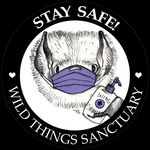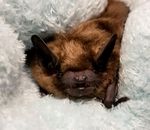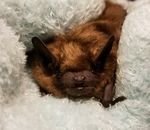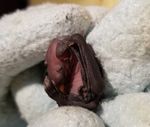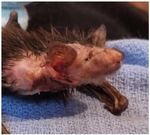Happy Holidays from Wild Things Sanctuary!
←
→
Page content transcription
If your browser does not render page correctly, please read the page content below
ews letter from Wild Things San
An ctu ar ter 2020
y, Inc. • Win
Happy Holidays from Wild Things Sanctuary!
Happy Holidays to one and all! It's been a challenging
year for everyone, and I hope that this finds you all safe and
well. It almost feels silly or inconsiderate putting together a
newsletter about the trials and tribulations of Wild Things
Sanctuary when I know so many folks out there have had a
year full of struggles. It's my hope that some of the happy
stories of the little patients here will help lift you up and help
your spirits fly.
Amid the COVID-19 pandemic, Wild Things was faced with a
big challenge this year to keep bats safe—and part of that was
helping spread correct information after these little mammals
were one of the first scapegoats when the pandemic started.
I'll talk a bit more about this on the next page, but in short,
there was no reason to fear the bats in our neighborhoods.
However, scientists did have a big worry: could humans give
bats COVID-19? Might this be the disease that pushes declining
bat populations over the edge? As more cases were reported
of pets and other animals getting COVID-19, and knowing that
bats have to be one of the worst species at social distancing,
the fear became real. What were we going to do?
The New York Department of Environmental Conservation "Contactless delivery" at Wild Things Sanctuary. Below, "Stu" is our first winter
(NYSDEC) put together a kind of bat task force to discuss bat. He is a young Big brown bat, found outside in the freezing cold in Utica, NY.
how to move forward. Bat biologists across North America
whom were pregnant females who ended up having their pups
were being advised to discontinue field work and many
here, and many had twins. This translated into a LOT of bats!!
states decided to stop bat rehabilitation. I am grateful that
And the waiting line to get into the flight cage for practice
the NYSDEC agreed with me that by banning intake of bats
meant that many orphan pups didn't get enough flight time, so
in trouble, it meant that it would put both bats and people
they are overwintering here. At present, Wild Things is hosting
at risk—people might be exposed to
about triple the number we usually have at this time of year.
rabies, and bats might be exposed to
COVID-19, or cared for by untrained, My responsibilities to the bat patients also meant that I had
well-meaning members of the to almost completely shut down volunteer animal helpers, so
public. So, Wild Things Sanctuary more bats and less help. I was grateful to be on the front lines
had permission to stay open, to help animals, but as you can imagine, there were times this
but we were not permitted to year that felt pretty overwhelming! But thanks to the support
release any patients until it was and kind words from so many people like all of you receiving
determined that they had not this newsletter, we got through.
been exposed to the virus. So, onward to 2021! Stay safe,
This was great news, but it
meant that the 98 bats I had
by the end of winter had to
stay here until summer when I
got the OK to release—many of
Victoria Campbell, President & Founder
The Wild Times 2020 • Page 1The Wild Times 2020 • Page 2
A Quick Overview: COVID-19 & Bats Bats & Disease:
QUIZ: Bats & Your Health
All animals, humans and bats included, harbor viruses, many of
which have evolved within a particular species and do not cause Where did COVID-19 come from?
those animals to get sick. Some bats have coronaviruses, and
humans do as well, as do other animals. Researchers have found
that a coronavirus like the one infecting humans as COVID-19 is
found in a bat species, but it's still not similar enough to infect
humans. Recent research indicates that, all being equal, the
number of human-infecting viruses in bats is similar to those A. Bats B. Not sure C. A lab
found in other mammals (Mollentze and Streicker, 2020).
Danger arises when viruses jump from one species to another, Who's more likely to make you sick?
as the new species may not have developed an immune response
to this new-to-them virus. This kind of “spillover” event is
historically rare, but there’s a good chance that increased human
activity and populations will create more chances for spillovers to
occur. How? In two main ways:
A. A bat B. A rodent C. A pre-schooler
1) When humans bring species together in markets or encroach
on wildlife habitat, there is a greater chance for cross-species What's the most dangerous animal?
transmission of viruses.
2) Habitat disturbance can stress animals, potentially making
them more susceptible to viruses and/or produce viruses in
greater numbers.
This means that the best way to keep people safe is to respect
wildlife and their natural habitats. Are we up to that challenge? I A. An angry bat B. A shark C. A mosquito
hope so! Illustrations by Virginia Greene.
For a list of refereces about bats, viruses and COVID-19, see www.bats911.org. Answers: B, C, C
Feel Good Stories 2020
PeeWee arrived at 3.2
grams with a badly broken
wing at the elbow. I took
a chance that baby bones
heal well, designed a mini
restraining device, made
a special cast to accomo-
date growing bones, and
look at him now!
Roxy arrived at WTS at five weeks old with severe metabolic bone disease (top row). She had been Nardi was a super tiny newborn
found as a newborn and didn't receive the care she needed, resulting in deformed bones and Big brown bat orphan: 3.03
other issues. Thankfully, with proper care, a lot of the deformities almost compleltely resolved grams. How could he survive?
and she is able to fly. Bottom row photos taken in November, almost four months after arrival. Well, he showed us that he
wasn't going to let his diminutive
Lucky Z almost had size stop him! (Baby photo shows
his head bitten off him curled up on his back).
by a cat, but has
been restored to
full fluffy cuteness!
In the flight
cage, he always
roosted with all
the orphans, so
became like a WTS
big brother.The Wild Times 2020 • Page 3
Your year-end gift makes a BIG difference to Wild Things!
Wild Things Sanctuary, Inc. is a 501(c)3 not-for-profit organization, EIN#: 68-0573815.
All donations are tax deductible to the full extent allowed by law.
Please send to: Wild Things Sanctuary, Inc., P.O. Box 713, Ithaca, NY 14851
You can also donate online at www.wildthingssanctuary.org
Enclosed is my tax-deductible gift of $
Name:
Address:
Wheeler Dealer is a Big brown bat who was found
frozen to a wall on a frigid day. The area is home to
a feral cat colony and his injuries were consistent
with being caught. It's amazing that he was found,
and is now settled in at Wild Things Sanctuary.
Email: Thanks to supporters, he has a chance to heal!
Crafts for the Wild Things 2020 Talks & Presentations
I was honored to give a presentation
at this year's Northeast Bat Working
Group (NEBWG), a group of
scientists, agencies, organizations,
industry, and individuals interested
in bat research, management,
and conservation. Being in the
Northeast, NEBWG has been an
essential group following and
investigating white-nose syndrome.
Wild Things Sanctuary received some special dona- It was the first time rehabilitators
tions from Trumansburg Crafting for Critters and presented at the conference. I to Cornell's vet student Zoo and Wildlife Society (ZAWS).
Crafters & Artisans for Rescued Animals (CARA). We talked about the small bats of This talk focused on wildlife rehabilitation, bats, and the
the genus Myotis that have been creative treatments and diagnostics that accompany their
loved the tiny bat blankets designed for newborn bats.
treated at Wild Things Sanctuary. care.
Pictured above is a week old Big brown bat (with a
mealworm pacifier), just fed, and wrapped up in her Although I don't see many in a year, Finally, thanks to the Endwell Garden Club for hosting a
blanket before being placed in an incubator. Local art- perhaps six at the most, apparently fun Zoom event where I was invited to talk about bats
I still see more than are observed in and gardening.
ist Carol Bloomgarden also made us a gorgeous set
other areas of New York. Interested in a talk? Let us know, we love spreading the
of tiny bowls—so my bat patients now have a nicer
place-setting than me! It was also great to give a presentation batty word!
Wildlife Mindfulness Award-Winning Documentary
Wildlife can get in trouble in all different Congratulations to Ithaca College students Becca
kinds of ways. This year we took in three Hetzel, Edie McRoberts, and Mia Thorne for their
bat patients who got trapped in shutters documentary, Wild Things. The short film won Best
(bats like roosting behind them), like the Documentary at the Ithaca Student Film Festival (and
Big brown bat pictured at right. This lit- Audience Favorite), out of more than 100 entries. It
tle guy was lucky as he was spotted right follows the rescue of a Big brown bat patient found
away and rescued. Be mindful of keeping in a snap mousetrap with a broken wing. As of press
animals safe if your New Year's plans in- time, the patient is flying again. I hope to release her
volve construction. in 2021.wild things sanctuary, inc.
P.O. box 713
Ithaca, ny 14851
Address Service Requested
Mission Statement
Wild Things Sanctuary, Inc. (WTS) is ded-
icated to helping native wildlife through
rescuing and rehabilitating debilitated and
orphaned/displaced animals until they are
ready for release back into the wild.
WTS is also committed to improving the
well-being of wildlife through public edu-
cation, focusing on how humans can safely
and peacefully coexist with native wildlife,
and on wildlife’s importance to man and
the environment.
WTS specializes in caring for native bats,
a beneficial group of animals in desperate
need of care as numbers continue to de-
cline due to disease and misunderstanding.
Keep up with us on Facebook,
www.wildthingssanctuary.org, or
www.bats911.org
This newsletter is printed on recycled paper.
Enjoy and share!
Small Animal Rescue: UPDATE
Illustration by Virginia Greene.
Thanks to the Wild Things Community!
Special thanks to our 2020 volunteers and batmobile drivers: A. DeLorm; J. Fan;
M. Fishman; L. Garner; R. Guttridge; H. Hauck de Oliveira; A. Kelly; L. Lassiter; S.
Kowalczyk; P. Leonard; A. Michaelson; C. Mosher; A. Palmer; V. Perez; C. Persons;
WTS was happy to help the local SPCA get the word out about hundreds of small L. Richter; A. Roy; J. Safran; N. Smith; A. Venuti; D. Wilkinson. Hope I remembered
animals dumped in the snowy woods as last year's newsletter was going to press. We everyone!
reached over 1.4 million Facebook users, and all the survivors found homes! On day Our wonderful veterinarians: B. Barry; B. Collins; E. Davies; L. Donato & Radnor
three, I went out with friends and we found two surviving rats. The SPCA was full so I staff; J. Morrisey; the team at the Cornell Animal Diagnostic Center; staff at the
took them home...and what happens when you get a a pair of rats cuddled together Cornerstone Veterinary Clinic.
to stay warm? Mom, Ruby Rose, had 11 pups with dad, Cornelius. Dad and the six boy Also: S. Stronsick at the Pennsylvania Bat Rescue; Wildlife Resolutions; the Tompkins
pups were neutered and they now all live together at WTS, bringing a lot of fun and County Health Department; C. Herzog at the NYSDEC; D. Wohlgemuth at Wildlife
mischief every day. A very happy Year of the Rat indeed! From top: me & Ruby Rose, Wishing Well; T. Volke at The Nature's Way; L. Bowen; J. Hermanson; G. Whitman;
Cornelius, pups at three days, six brothers. colleagues at my Cornell University “day” job for supporting my work with WTS.
P.O. Box 713, Ithaca, NY 14851 * www.wildthingssanctuary.org * (607) 200 4100You can also read





